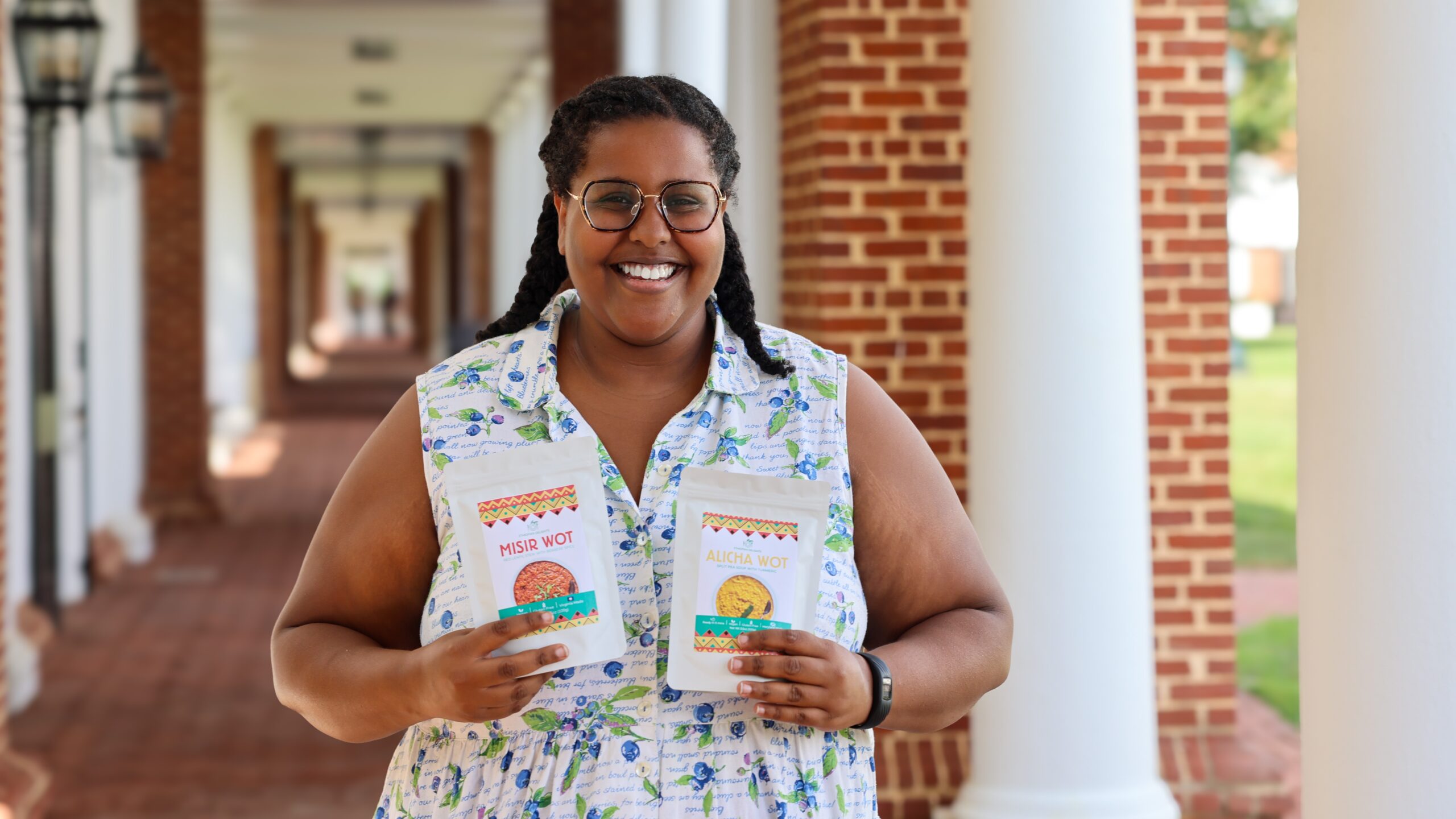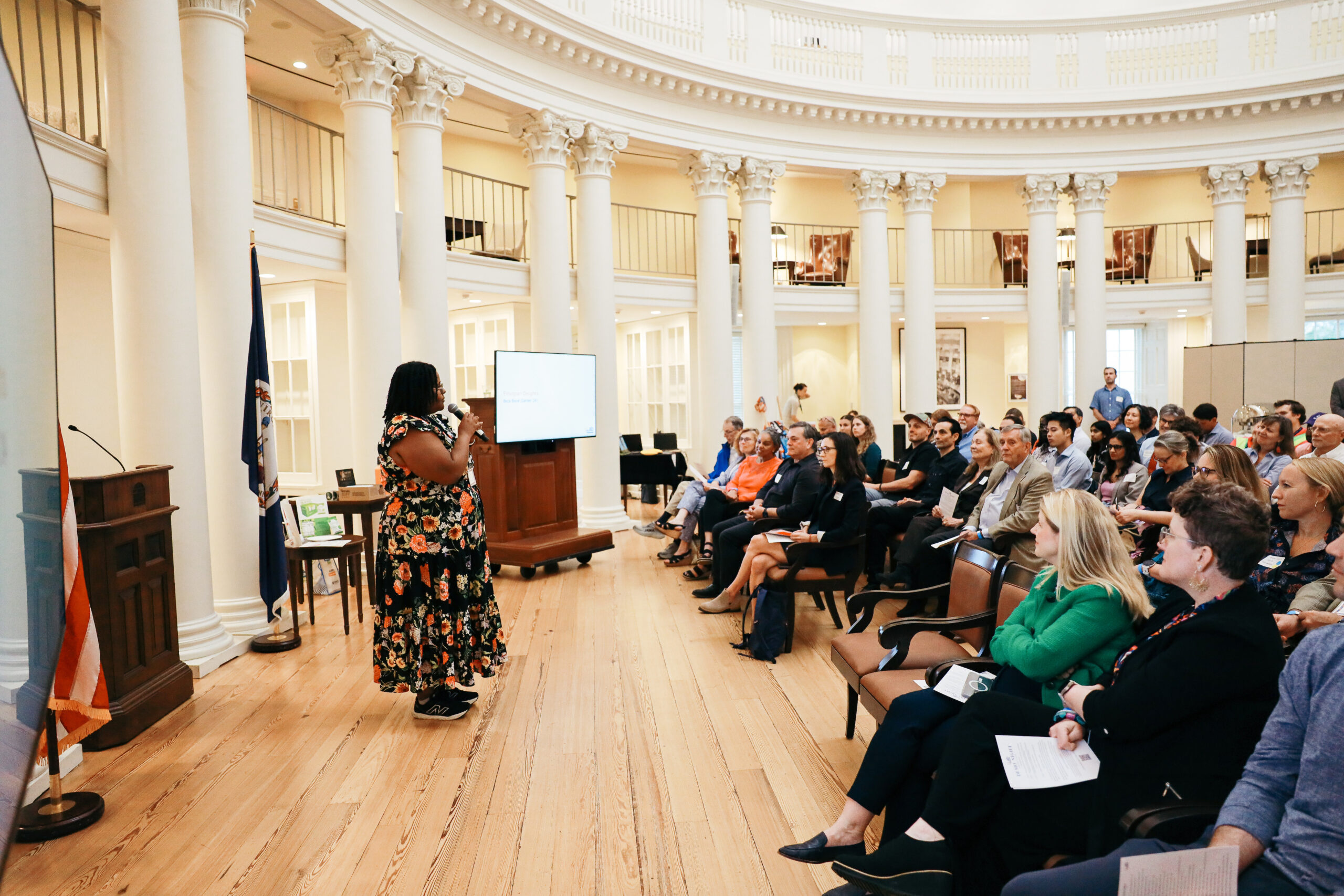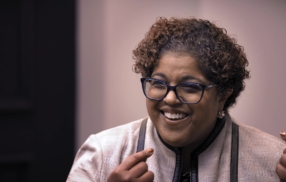
Food Startup ‘Ethiopian Delights’ Serves Cultural Connection
By Molly Mitchell
The Ethiopian community was always close at hand for Beza Bisrat (MBA ’24) growing up in Silver Springs, Md., a suburb outside Washington, D.C. Surrounded by family and the broader Ethiopian community in the area, cultural touchstones were always close at hand.
“I saw myself as fully Ethiopian,” said Bisrat, who is focusing her heritage, cooking ability and business acumen on a food startup called “Ethiopian Delights.”
“There were a lot of ways for me to feel a part of my community. If we wanted food, if we wanted coffee, if we wanted to interact with other people, there were just so many places we could go.”
Ethiopian food is uniquely community focused. “Ethiopia is the only country to never be colonized in Africa, and I believe that because of this, Ethiopian cuisine has been uniquely preserved through history,” said Bisrat. An Ethiopian meal involves sharing a large plate of injera and wot (fermented bread and the Ethiopian equivalent of curry) among family and friends. Similar to Indian or Mediterranean food, Ethiopian curries and hearty stews are flavored with aromatic spices. It is enjoyed by tearing off pieces of the injera bread and eating with your hands.
“You won’t see forks or knives at a traditional Ethiopian dinner table,” said Bisrat. “And you’ll see people feed each other, which is called a gursha. When I think about my heritage, I think about how it emphasizes community, hospitality, and care, and you see that in the way we feed each other.”
When Bisrat left home to attend Northwestern University to study chemical engineering, she realized how unique her home community really is. Living in Evanston, Illinois, a suburb of Chicago, Bisrat was suddenly confronted with the difficulty of finding Ethiopian cuisine and the lack of cultural understanding she had taken for granted back home. “I saw that I was Ethiopian and I still had that identity, but people didn’t really know what that meant,” she said.
Even so, Bisrat appreciated the new experiences and people she met, and soon graduated and began a career in food manufacturing with companies like General Mills and Danone North America. These jobs took her to a series of small towns with limited access to Ethiopian communities and culture. While it was a bit lonely at times, these sojourns prompted her to learn more about Ethiopian cooking.
“I would stockpile spices and ingredients and cook things at home, and I’d feel a little bit more connected to my family, to my culture,” she said.
At the same time, Bisrat felt restless in her career. After several years in traditional manufacturing, she transitioned into consulting, working with government agencies like the USDA. “When I moved into consulting, there were career paths I had never learned about before. And I had all these skills that I hadn’t really used in my previous career that I wanted to develop a little bit further,” she said.
Exposure to other career paths got her wheels turning, and entrepreneurial inclinations rose to the surface as well. So, she decided to get an MBA.
Bisrat was drawn to the University of Virginia Darden School of Business thanks to its proximity to DC, strong focus on academics and the fact that Darden is a state school. “I wanted some of the experiences and resources that come from such a large state university with such a strong brand,” she said. Landing a scholarship for entrepreneurship from Darden’s Batten Institute for Entrepreneurship, Innovation and Technology sealed the deal, and she headed to Darden. “Getting the Batten scholarship was just very encouraging,” she said.
Between classes and mentorship from professors like Saras Sarasvathy, and support from peers in the KPI Club, a group of women entrepreneur peers at Darden who meet to support each other, Bisrat’s idea for an Ethiopian food business came into focus.
“That was the place where I thought, okay, I can really see myself as an entrepreneur,” she said. “Let’s do it.”
Finally, meeting other Ethiopian students at UVA made her realize that access to Ethiopian food was a real pain point for others that her business could help address.
“I realized that they were struggling with all the same things that I had been through my lifetime. The inability to access Ethiopian cuisine, and more largely Ethiopian culture, was something that they couldn’t do, even in a place like Charlottesville,” she said.
Bisrat had lots of experience living in small towns with limited access to her cultural touchpoints. But it surprised her that people in a larger town like Charlottesville, near DC, felt similar struggles. “That’s when I thought, this feels like a need that’s not just me, not just my family, but lots of people everywhere. And so that’s what pushed me to take this on.”

Beza Bisrat (MBA ’24) pitches Ethiopian Delights to a crowd in UVA’s Rotunda for the iLab Incubator Demo Showcase.
Access to specific cuisine is just one building block for cultural connection, but Bisrat knows it’s an important one.
“A culture is made up of so many different things,” said Bisrat. “Food is only one piece of it, but I think a big piece. It’s how you nourish yourself, how you take care of yourself, how you show love to others by cooking for other people. It’s a focal point of a lot of celebrations and events.”
With her background in food manufacturing, Bisrat began experimenting. She wanted her product to be shelf-stable and easy for people to prepare. She spent time testing recipes, dehydrating food and preparing prototypes in her kitchen. Soon, she began selling small batches at local pop-up events, and the response was overwhelmingly positive. These small experiments were a way to ask the community directly if they were interested. “The answer was a resounding yes,” she said. In April of this year, Bisrat took home the grand prize at the annual Crowdfunded Pitch Night at Charlottesville’s Tom Tom Festival.
Now, Ethiopian Delights offers three products through its online store, and Bisrat has moved production to a commercial kitchen. She has identified people with dietary restrictions as another potential customer base, as well.
“We attract a lot of people with dietary restrictions – much of Ethiopian food is naturally gluten-free, in addition to vegan, and that’s something we try to preserve in my company’s products,” she said. She is in discussions with online retailers and brick-and-mortar stores about distribution opportunities, and she spent the summer participating in Darden’s iLab Incubator program, which provides mentorship and resources for early-stage entrepreneurs.
“Beza is a perfect example of what the Batten Institute is about,” said Omar Garriott, Executive Director of the Institute. “From coming in as a Batten Scholar to nurturing her startup idea throughout her experience as a student to participating in the iLab Incubator immediately upon graduation – while also getting an intensive world-class education – she is why we do what we do. Regardless of what she pursues in her career post-MBA, we know she has the entrepreneurial bug, and foundational mindset and skill set that will make her an effective leader and change agent. Oh, and her recipes are fantastic!”
While her startup can’t replicate home, Bisrat says that Ethiopian Delights has been an effective connection point to her cultural heritage and community-builder.
“This venture has allowed me to learn even more about my culture, and to meet other Ethiopians in places I wasn’t expecting,” she said. “It’s been exciting to see how much it’s grown in such a short amount of time. And I look forward to seeing where it goes.”
The University of Virginia Darden School of Business prepares responsible global leaders through unparalleled transformational learning experiences. Darden’s graduate degree programs (MBA, MSBA and Ph.D.) and Executive Education & Lifelong Learning programs offered by the Darden School Foundation set the stage for a lifetime of career advancement and impact. Darden’s top-ranked faculty, renowned for teaching excellence, inspires and shapes modern business leadership worldwide through research, thought leadership and business publishing. Darden has Grounds in Charlottesville, Virginia, and the Washington, D.C., area and a global community that includes 18,000 alumni in 90 countries. Darden was established in 1955 at the University of Virginia, a top public university founded by Thomas Jefferson in 1819 in Charlottesville, Virginia.
Press Contact
Molly Mitchell
Senior Associate Director, Editorial and Media Relations
Darden School of Business
University of Virginia
MitchellM@darden.virginia.edu




